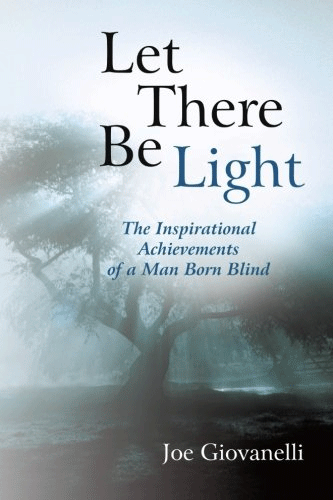
Ideas come from experiences.
For writing inspiration, we need only pay better attention to our surroundings and find the extraordinary among what others would judge as ordinary.
The more we read, the more we experience, and at any moment we can grab one of those experiences and tell our own story, either in fiction or nonfiction form.
Here’s a great passage from Let There Be Light, which tells something Joe Giovanelli learned about being blind.
Then there was the lesson that Dad taught me indirectly. He had an expensive pocket watch, and I thought I’d like to see what was inside its case. I forced it open and bent the sections holding the gearing. The watch was beyond repair! Dad walked into the room and asked what I was doing.
“Nothing,” I said and laid the parts on the dresser— not realizing that he knew what I just did. I got a pretty good spanking, I mean really good— and he ran out of the house. Sure, I deserved it, but I wondered how he knew that I put all the broken parts on the dresser. I knew there was something not quite right, but I could not imagine what it was. That puzzled me how Dad could sometimes know things which I could not know. I can’t remember when my parents told me that I was blind and how that fit into the puzzle.
Could we glean an idea from Giovanelli’s story and write a short story or devotion that would make an important point?
Yes, if you imagine being in that situation, becoming the character, and then tell your story. Here’s one way that practice might look:
Puzzled
Thought for the Day: Are we wearing blinders that restrict our vision?
Because Johnny was blind, exploring his world and making discoveries required skillful use of hearing, touch, and smell. Somehow, Daddy used his expensive pocket watch to tell time, which was different from feeling the sun’s warmth and knowing it was day.
He held the watch in his hand, wondering. Could Daddy tell time by holding the watch to his ear, somehow counting the tic-tic-tic? He found a seam along the side, and with a flat-blade screwdriver forced the case open. Wheels and cogs meshed into one another, and something was moving in pace with the ticking sound.
Daddy walked into the room. “What are you doing?” His tone was harsh, as if Johnny had done something bad.
“Nothing.” Johnny laid the parts on the dresser, out of sight.
After a severe spanking, Johnny tried to figure out the puzzle. Johnny had put the parts back on the dresser, but somehow Daddy knew how they got there. How could his dad know so much that Johnny could not know?
Then, one day, Daddy said, “You’re blind, and I am not.”
That solved the puzzle.
Jesus never condemned being blind. The problem, he said, was in saying we could see when we couldn’t. — John 9:41




